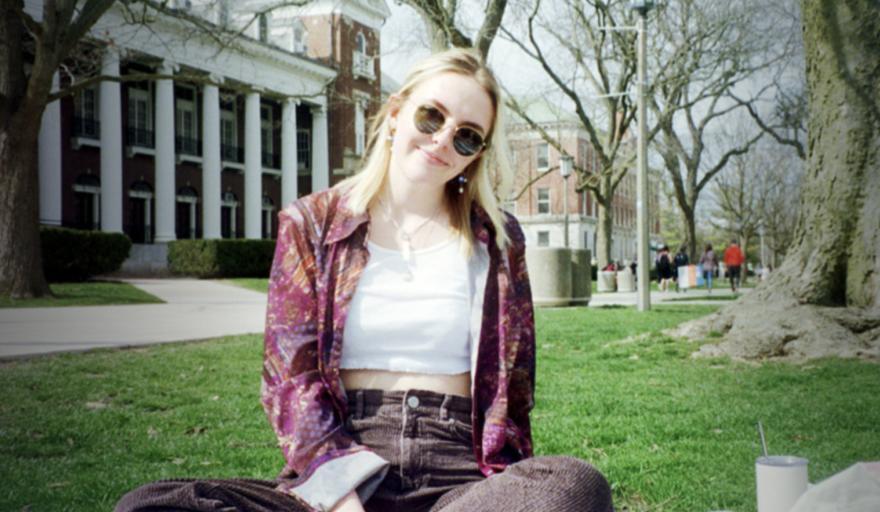Leading With Passion
Abbey Malbon
BSW '22

Going After What She Wants
Right from the start, recent social work graduate Abbey makes it clear that she isn’t shy about going after what she wants.
As a high school student, Abbey once sought support from a school social worker when she was undergoing anxiety. But instead of feeling better, she walked away from the conversation feeling like she was alone in her experience.
Instead of becoming discouraged, Abbey thought about how she would’ve handled the situation differently. “I had this little moment of like, ‘I think I can do your job better than you can,’” she says.
From then on, Abbey knew she wanted to go into social work.
Despite thinking she would end up studying in an urban environment, Abbey found herself at UIUC, where she was surprised to find the same diversity of people, communities, and social issues she expected from a big city.
“Champaign-Urbana is a global city in the middle of the cornfields,” Abbey says. “I was naive to believe that there wouldn’t be urban issues here, because there are issues happening in Chicago that are happening here.”
She fell in love with the campus and found a place to call her own in the School of Social Work among professors and peers who supported her the whole way.
“All my professors knew me personally. They were really there to prioritize my well-being and my success.”
Because of these relationships, Abbey had an easier time carving her own path. Instead of a clinical focus, her interests lie on the policy side—specifically, menstrual equity and period policy.
When asked how she discovered a passion in menstrual equity, Abbey offers a retrospective smile. “It chose me,” she says.
As a high school sophomore, she wrote for her school newspaper, where she wanted to tell stories that would make an impact. When she saw an issue with her school’s lack of period products in the bathrooms, she took action.
“I found out that it was actually a law in the state of Illinois that my high school should have already been supplying [period products]. It was called the ‘Learn with Dignity Act,’ and it required that all middle schools and high schools supply free menstrual products in bathrooms. So, I wrote about it.”
Her story set off a flurry of pushback from school administrators, but Abbey never faltered. With tenacity far beyond her years, she faced the higher-ups in her school district head on.
“I got pulled into the principal’s office, and he essentially [said], ‘This made the school look bad. You shouldn’t do it anymore.’”
“No,” Abbey told him, “It makes you look bad that you aren’t following the law, not that I’m writing about it.”
The school remained hesitant to change their policies, so Abbey took her story to other media outlets. After speaking with local radio stations, she earned the opportunity to make noise on a national scale.
“I wrote an op-ed for Teen Vogue. And then, finally, [my administrators] were like, ‘How can we help you?’”
When they asked her what she wanted, she made it clear that her intention was never to earn notoriety for herself.
“It’s not a me thing. I’m doing this because I have access to these platforms. But ultimately, it’s for the students. I was a senior at this point; I was leaving next year. I just wanted to make sure that this [change] was implemented before I left.”
And thanks to her relentless efforts, free period products were placed in the bathrooms across the district.
Not every high school student would have had the self-confidence necessary to challenge the school board, but Abbey’s parents taught her from an early age to never back down.
“My mom is one of the most outspoken women I know. She is my hero, and she raised me and my brothers on the idea ‘Don’t ask for permission, ask for forgiveness.’”
Abbey took that lesson to heart. She makes her own rules in life and wants the same kind of freedom in her future career. In the field of social work, Abbey knows she’ll get that opportunity.
“I realized you can study social work and you do not have to be a social worker. You can be a policymaker, you can work in HR, you can do on-the-ground mutual aid work or be a leader of a nonprofit. It’s really a [field] that provides a lot of flexibility.”
After graduating in just three years, Abbey is now pursuing her masters at the University of Michigan. She plans to lean into her experience in period policy, but with the flexibility of her degree, she knows the future is wide open.
“I would really just like to be working with people, helping people. I definitely could see myself, years down the line, maybe exploring a clinical focus and becoming a therapist. I just want more experience in life and to be older and wiser in order to do that. But definitely still sticking with social justice, focused on policy and human rights.”